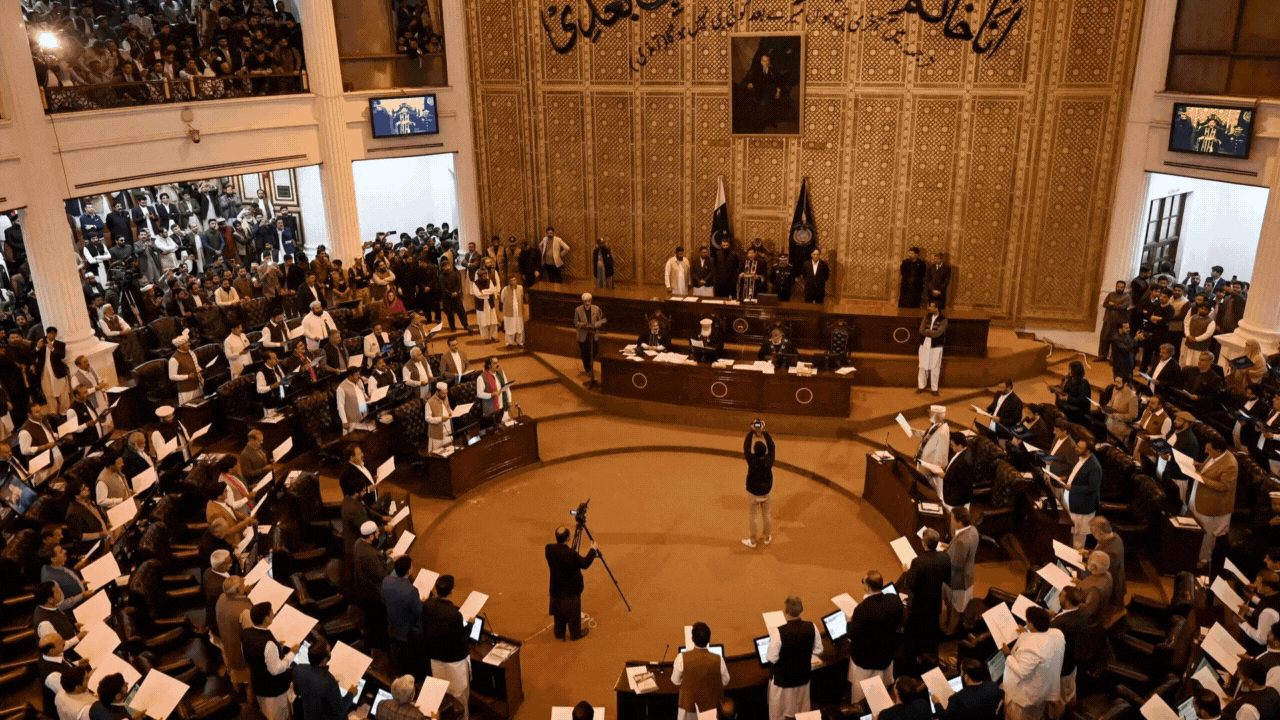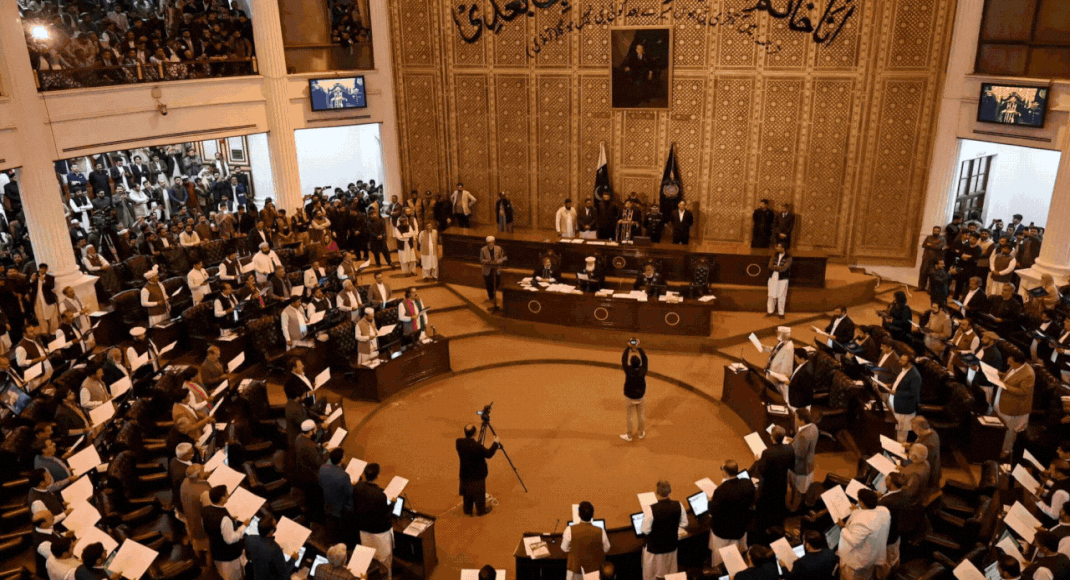
NEW DELHI: The recently elected lower house of parliament in Pakistan convened for its inaugural session on Thursday. Newly elected members were sworn in, but the proceedings were disrupted by protests from supporters of imprisoned former prime minister Imran Khan.
The Parliament’s opening session commenced with a delay of over an hour. Outgoing Speaker Raja Pervaiz Ashraf administered the oath to the newly-elected lawmakers amidst disorderly scenes, with lawmakers supported by Imran Khan’s Pakistan Tehreek-e-Insaf party chanting slogans against alleged vote rigging in the February 8 elections.
The Sunni Ittehad Council (SIC), backed by Imran Khan, alleges that the national election on February 8 was tainted by rigging and has called for a thorough audit of the polls.None of the parties managed to secure a majority.
However, despite candidates supported by Khan winning the most seats, the Pakistan Muslim League-Nawaz (PML-N) and Pakistan Peoples Party (PPP) have joined forces to form a coalition government.
“Who will save Pakistan? Imran Khan, Imran Khan,” SIC members chanted as legislators, including the prime minister in waiting Shehbaz Sharif, signed the membership register of the National Assembly.
During the session, a member of the SIC held up a poster demanding the release of Imran Khan as he approached the speaker’s dais to sign. Omar Ayub, the SIC’s representative nominated by Khan for the position of prime minister, informed reporters that the party would push for Khan’s release.
The election for the prime minister is scheduled for March 4, according to local media. The session occurred under heavy security measures following disturbances earlier in the week during the inaugural session of the Khyber-Pakhtunkhwa provincial assembly, where Khan’s supporters are set to form the government. Some members were reportedly pelted with pens and slippers from the visitor galleries.
Following the oath-taking, lawmakers proceeded to sign the register roll of the National Assembly, officially confirming their membership. Among the newly sworn-in lawmakers were Nawaz Sharif, the leader of the Pakistan Muslim League-Nawaz (PML-N), Shehbaz Sharif, the President of PML-N, Asif Zardari, the Co-chairman of the Pakistan Peoples Party (PPP), and Bilawal Bhutto-Zardari, the Chairman of PPP.
Earlier today, President Alvi endorsed a request from the caretaker parliamentary affairs ministry to convene the inaugural session of the newly-elected National Assembly on February 29, as stated in a post on the president’s official X account.
Taking to X he said, “Subject to some reservations, President Dr Arif Alvi has summoned to convene the National Assembly on February 29 in exercise of the powers conferred by Article 54(1) of the Constitution of the Islamic Republic of Pakistan,” the statement said. It said that the president accorded his approval keeping in view “the mandate and implications of the timeline given in Article 91 (2) and subject to some reservations and expecting the resolution of the issue of the reserved seats before the 21st day.”
A statement from the National Assembly’s media wing mentioned the cancellation of visitor passes for the upper galleries due to security concerns. Not all members of the 336-member house took the oath, as the allocation of 70 reserved seats for women and minorities is still awaiting adjudication by the Election Commission of Pakistan (ECP).
The ECP will determine the allocation of reserved seats for the SIC, which did not secure any seats in the elections but later joined forces with successful independent candidates who had backed Khan. Although the ECP concluded hearings on the matter on Wednesday, a ruling has yet to be delivered.
Khan’s party was disqualified from the polls for violating electoral laws, and independent candidates are ineligible for reserved seats. The ECP’s decision will not impede Sharif’s alliance from forming the government, but the additional seats will be crucial to ensuring the minority government can comfortably pass significant legislation and counter the opposition from the SIC.
The Parliament’s opening session commenced with a delay of over an hour. Outgoing Speaker Raja Pervaiz Ashraf administered the oath to the newly-elected lawmakers amidst disorderly scenes, with lawmakers supported by Imran Khan’s Pakistan Tehreek-e-Insaf party chanting slogans against alleged vote rigging in the February 8 elections.
The Sunni Ittehad Council (SIC), backed by Imran Khan, alleges that the national election on February 8 was tainted by rigging and has called for a thorough audit of the polls.None of the parties managed to secure a majority.
However, despite candidates supported by Khan winning the most seats, the Pakistan Muslim League-Nawaz (PML-N) and Pakistan Peoples Party (PPP) have joined forces to form a coalition government.
“Who will save Pakistan? Imran Khan, Imran Khan,” SIC members chanted as legislators, including the prime minister in waiting Shehbaz Sharif, signed the membership register of the National Assembly.
During the session, a member of the SIC held up a poster demanding the release of Imran Khan as he approached the speaker’s dais to sign. Omar Ayub, the SIC’s representative nominated by Khan for the position of prime minister, informed reporters that the party would push for Khan’s release.
The election for the prime minister is scheduled for March 4, according to local media. The session occurred under heavy security measures following disturbances earlier in the week during the inaugural session of the Khyber-Pakhtunkhwa provincial assembly, where Khan’s supporters are set to form the government. Some members were reportedly pelted with pens and slippers from the visitor galleries.
Following the oath-taking, lawmakers proceeded to sign the register roll of the National Assembly, officially confirming their membership. Among the newly sworn-in lawmakers were Nawaz Sharif, the leader of the Pakistan Muslim League-Nawaz (PML-N), Shehbaz Sharif, the President of PML-N, Asif Zardari, the Co-chairman of the Pakistan Peoples Party (PPP), and Bilawal Bhutto-Zardari, the Chairman of PPP.
Earlier today, President Alvi endorsed a request from the caretaker parliamentary affairs ministry to convene the inaugural session of the newly-elected National Assembly on February 29, as stated in a post on the president’s official X account.
Taking to X he said, “Subject to some reservations, President Dr Arif Alvi has summoned to convene the National Assembly on February 29 in exercise of the powers conferred by Article 54(1) of the Constitution of the Islamic Republic of Pakistan,” the statement said. It said that the president accorded his approval keeping in view “the mandate and implications of the timeline given in Article 91 (2) and subject to some reservations and expecting the resolution of the issue of the reserved seats before the 21st day.”
A statement from the National Assembly’s media wing mentioned the cancellation of visitor passes for the upper galleries due to security concerns. Not all members of the 336-member house took the oath, as the allocation of 70 reserved seats for women and minorities is still awaiting adjudication by the Election Commission of Pakistan (ECP).
The ECP will determine the allocation of reserved seats for the SIC, which did not secure any seats in the elections but later joined forces with successful independent candidates who had backed Khan. Although the ECP concluded hearings on the matter on Wednesday, a ruling has yet to be delivered.
Khan’s party was disqualified from the polls for violating electoral laws, and independent candidates are ineligible for reserved seats. The ECP’s decision will not impede Sharif’s alliance from forming the government, but the additional seats will be crucial to ensuring the minority government can comfortably pass significant legislation and counter the opposition from the SIC.
Source link

